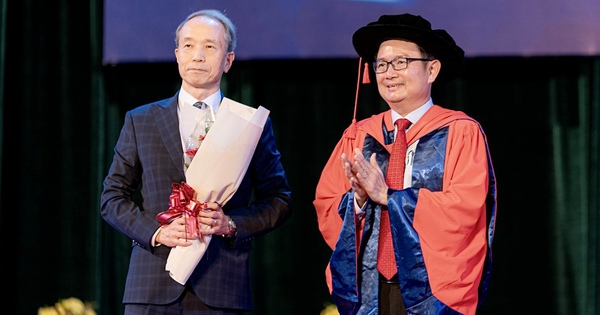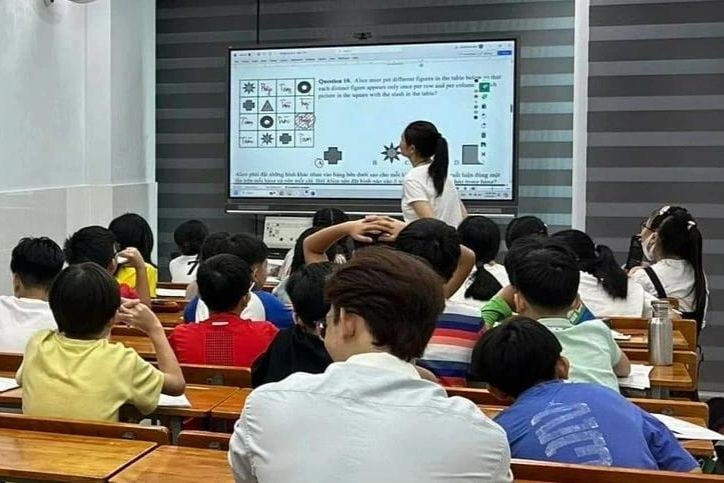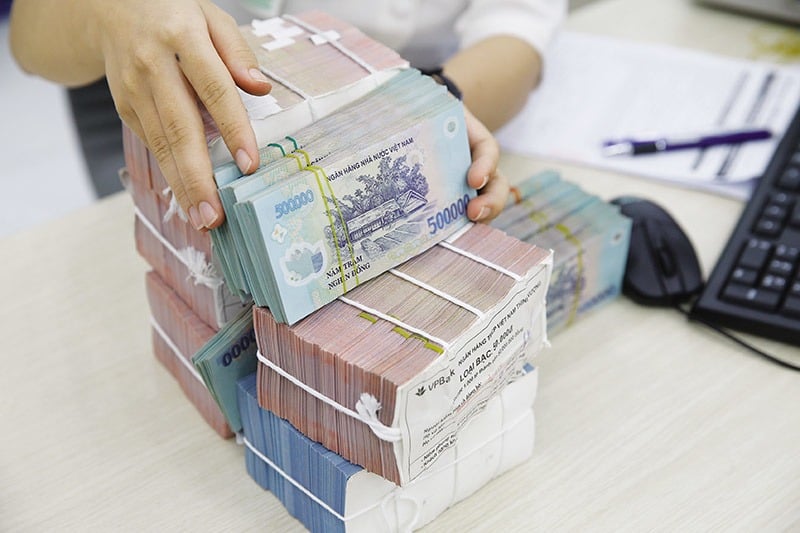SWITZERLAND As soon as he sat down at the dinner table, Martin asked his wife, "Where is the fish sauce?" in a Nghe An accent, making Ms. Hoa laugh.
Videos about the daily life of Martin Knöfel and Nguyen Thi Hoa, both 39 years old, in Switzerland have recently become popular because the Western son-in-law speaks fluently with a "country accent" and uses many local words correctly.
"I like to learn Vietnamese, especially speaking with the Nghe An accent, because I want to communicate easily with my wife's family and to help my wife ease her homesickness," said Martin.

Ms. Nguyen Thi Hoa and Mr. Martin Knöfel have lived in Switzerland for 13 years. Photo: Provided by the character
16 years ago, Martin Knöfel, a German civil engineer, came to Vietnam to work. He met Ms. Hoa through an acquaintance. They fell in love at first sight and got married shortly after. In 2010, they moved to Switzerland to settle down and went through the difficult early days.
Martin said that at that time, he had just graduated from school so his salary was low. Hoa went abroad for the first time, had no job and still had to pay for rent, electricity and water. There was a time when the most valuable asset of the couple was their bicycle.
The language barrier and financial constraints discouraged his wife, who cried every day. Every time he saw her sad, Martin would come over to comfort her. "Because of me, you have to leave your family, I will try to make it up to you," the man said. After work, he spent all his time with his wife, doing housework and cooking together. Later, Martin was also the one who guided his wife to study medicine, graduate, and get a job at an orthopedic trauma center in Switzerland.
However, many times, he saw Hoa still sitting absent-mindedly. Martin guessed that his wife missed her homeland. He thought that if she could speak her mother tongue every day, she would feel better. From then on, he planned to learn Vietnamese by himself, especially the Nghe An accent, even though it was a bit difficult to understand and pronounce for foreigners.
The first thing is that in daily communication, the German man proactively talks to his wife with a Nghe An accent, and improves his vocabulary by calling relatives in Vietnam regularly.
Martin has been back to his wife's hometown 20 times, but the titles like "me", "ba", "ma", "o", "tau", "bang choa"... overwhelm this man and he cannot remember them all. But he knows that to integrate with his wife's family, he needs to be fluent in Vietnamese, especially the Nghe An accent, so he tries hard to learn.
"Every time he saw something, he would ask 'how do you say it' and then write it down," Ms. Hoa said. When people talked, he listened carefully, guessed the meaning of each word, and asked again if he didn't understand. He listened and memorized, and gradually his vocabulary grew and became richer.
Many years ago, when Martin learned to speak Vietnamese with a broken accent, many people in his hometown did not understand. He repeated it, and everyone listened and laughed. Embarrassed, he fell silent and switched to speaking German to his wife. At that time, Ms. Hoa explained that people were not criticizing or mocking him, but were encouraging and praising him. Since then, every time he returned to Vietnam, the German son-in-law was very confident in speaking Nghe An dialect when going out.
However, because he learned by word of mouth, the German man was often teased for not understanding the meaning of slang. Once, during a meal, Martin asked his mother-in-law, "Have you eaten the khu man fruit yet?", causing the whole family to burst into laughter. In his mind, "khu man" was a type of fruit, because someone else had asked him this question before. But later he learned that it was the word "butt", which people used to tease each other.
Learning Vietnamese but speaking with a Nghe An accent, when talking to people from other regions, most of them do not understand what Martin says. Ms. Hoa had to teach her husband how to pronounce in common, for example, not saying "Di mo" but "Di dau", "Mạn rang" is "why". Martin has applied this rule very well, to this day he even knows how to automatically change his accent when meeting people from the same hometown like a real Nghe An guy.
"At times like that, I often compare it to 'The Nghe accent coming back' because when meeting someone from the same hometown, all distances are strangely shortened," Ms. Hoa shared.
Later, every time he went out with his father-in-law for a beer or to hang out, people around him would look at him with wide eyes. Someone couldn't help but ask curiously: "Why do you speak so well?". The German man laughed and said: "Because I'm a son-in-law from Nghe An!"
Although he had never taken any formal courses, and had only listened and spoken, Martin’s Vietnamese improved over time. He also taught himself to rhyme and pronounce, so after many years he could read a long poem in Vietnamese and write simple sentences. On his bookshelf, he had many books about Vietnam written by German authors. The foreign son-in-law also learned about famous people and national heroes and especially admired Uncle Ho and General Vo Nguyen Giap.

Martin Knöfel and his father-in-law on a visit to Vietnam, May 2023. Photo: Provided by the character
Martin does not live in Vietnam but has a good relationship with his wife's family. Every weekend, he calls his wife's parents in Nghe An to ask about them. Or whenever he wants to talk and sees his wife cooking a new dish, he calls his father to show off. Martin also remembers all the names of his parents' relatives, neighbors, and even friends so that whenever someone mentions them, he sends his regards.
Loving Vietnam, the foreign son-in-law also loves his wife's hometown cuisine, especially fish sauce. Every meal on the couple's tray has a bowl of dipping sauce mixed in Nghe An style with ginger, garlic, lemon and chili. This man is so addicted that if there is no fish sauce on the table, he definitely won't eat it. Every time he goes to the supermarket, the first thing he chooses is fish sauce, every trip he brings three bottles because he is afraid that they won't sell it in strange places.
In addition to fish sauce, Martin also likes other Vietnamese dishes such as vermicelli, pho, spring rolls, and hot pot. Most of the couple's meals are cooked Vietnamese style. On weekdays, when they come home late from work, they usually have three main dishes for dinner: a main dish, soup, and rice. On weekends, when she has time, Hoa will prepare more elaborate dishes such as vermicelli, pho, or grilled food.
Ms. Hoa shared that she always feels happy because even though she lives in a foreign country, she can speak her mother tongue and eat meals like Vietnamese people every day. Not only does she share all the work, but her husband also cares about her happy and sad feelings.
"Just by calling my wife, I can tell right away how I feel by hearing her voice," said Ms. Hoa. Although sometimes the couple have conflicts, they don't stay angry with each other for long, because just hearing him speak in Nghe An makes her feel warm.
For over a year now, the Vietnamese wife has been regularly posting clips of the couple talking to each other in Nghe An dialect on her personal page. Martin’s accent and sincere facial expressions while talking have been loved by many people.
"Not only me, but everyone watching the video feels happy and less stressed. His humorous Nghe dialect sentences also make the family always full of laughter," the wife shared.
Hai Hien
Vnexpress.net






























![[Photo] "Beauties" participate in the parade rehearsal at Bien Hoa airport](https://vstatic.vietnam.vn/vietnam/resource/IMAGE/2025/4/11/155502af3384431e918de0e2e585d13a)





























































Comment (0)